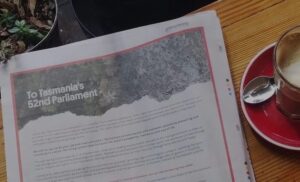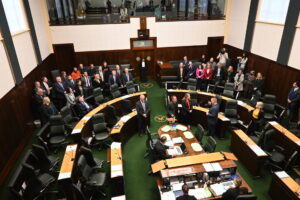Tasmanians have been badly served by its government’s exaggerated fears about the condition of the state budget.
The Pre-Election Financial Outlook Report released by the Treasury in February emphasised deficit and debt. It noted that the budget is in deficit of “in excess of $500 million … in each year” with “net debt forecast to increase to $6.1 billion by 30 June 2027”.
This all sounds very scary and suggests the government needs to rein in spending and reduce its level of debt.
But towards the end of the document you find that over the next few years the value of all the assets held by the government are set to increase quite rapidly from $15.4 billion to $17.5 billion at 2027.
That does not sound like a government about to go broke!
Think of a homeowner. The year you buy a house your spending exceeds your revenue (so yes, you are in deficit) and your debt has massively increased but crucially you now have a roof over your head – your assets have increased.
What makes sense for households also makes sense for the corporate sector. If we calculated BHP’s fiscal balance the same way we do the state government’s budget rather than a pre-tax profit of US$21.4 billion, BHP would have a deficit of US$4.9 billion or 9% of revenue.
Homebuyers and the corporate sector seem to know something that the state government does not. We focus too much on government debt and not enough on how many assets the government holds.
Debt did indeed increase over the pandemic years, but Tasmania’s net worth was barely affected and began rising once the lockdowns ended.
And far from being a budget basket case, the Tasmanian government’s amount of liabilities per population is just $7,617 – lower than any other state and well below for example the $19,121 per capita liabilities of the Victorian state government.
Tasmania also has the lowest level of state government debt per person.
But what good is that? Do Tasmanians get any benefit from that? No company CEO ever brags they have the lowest debt of any company – what they care about is their assets and how they are growing.
Companies with low debt are described as having a “lazy balance sheet”, because they are not investing enough to grow.
The same is true with governments.
The Tasmanian people have not benefited from the low level of state debt, rather they have missed out on the investment in schools, hospitals, roads, and services that other states are getting, because their governments know – like businesses and household do – that you need to invest to grow.
Tasmania currently is able to meet its spending commitment to pay teachers, nurses and other public sector workers. The “cash flow” of the government is actually in surplus.
But what it is not doing is making use of its assets and its ability to invest in infrastructure and services that will improve both the Tasmanian economy and the lives of all Tasmanians.
The government cannot obviously afford to do everything, but during an election is the perfect time to debate what should be done.
People who want to keep government small will always try to make us scared about debt and deficits. We act as though all those roads, bridges, hospitals and schools have no lasting value. But we know companies don’t think that way, and neither does anyone who buys a home.
Budget surpluses and low debt agendas hurt Tasmania because it suggests the government should not invest in projects that make social and economic sense thereby dooming Tasmanians to a poorer economy and a worse life.
Between the Lines Newsletter
The biggest stories and the best analysis from the team at the Australia Institute, delivered to your inbox every fortnight.
You might also like
Open Letter to the Tasmanian Government
The Australia Institute and 30 other organisations from around Tasmania have published an open letter with 10 asks for the environment from whomever forms Tasmania’s next government. When cross-benchers and major parties have struck successful power-sharing agreements elsewhere, they covered policy as well as procedure, making now the ideal time for progress.
Are Australians eating diseased salmon? Sickening new revelations from Tasmania
Shocking new revelations about Tasmanian salmon should leave all Australians feeling sick to the stomach.
It will take more than process to win crossbench support to govern
It’s pleasing to see a real competition emerging for government in Tasmania the state election a fortnight ago. The Labor Party is finally off the bench and in the game – making a play for crossbench support to form government after refusing the last two opportunities to do so. So far, negotiations are focusing on





